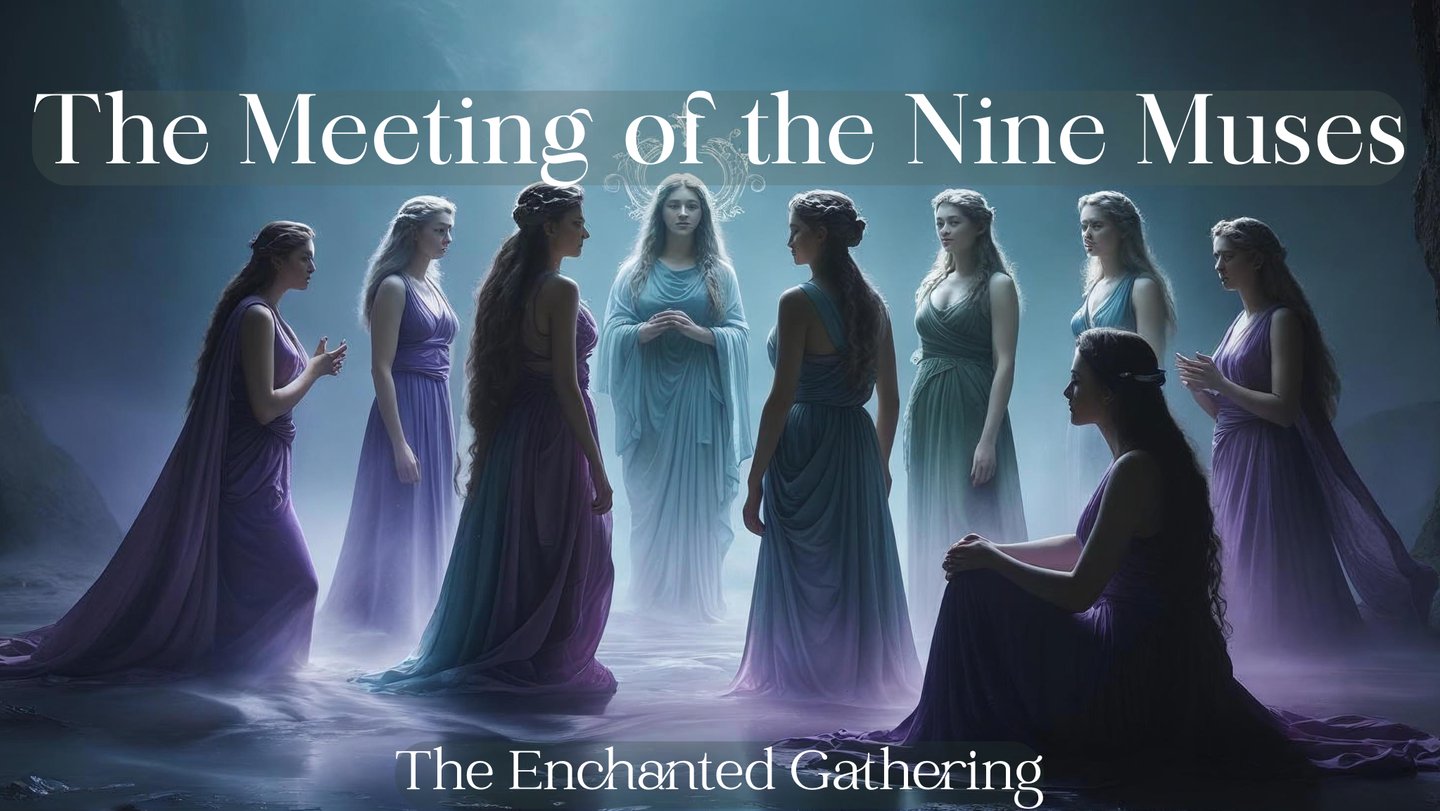Who Are the Nine Muses?
Where Inspiration Dances on the Edge of the Divine
In the veiled folds of twilight, high upon Mount Helicon or nestled deep in the sacred groves of Pieria, there is a hush that falls before the air begins to shimmer. The earth pauses. The stars lean in. And from the whispering mists, they emerge—the Nine Muses, daughters of Mnemosyne (Memory) and Zeus, god of thunder and sky.
These are not gentle maidens idly humming tunes. The Muses are the radiant, eternal keepers of all human expression, knowledge, and divine madness. Each Muse holds her own realm of creative fire, but when they gather—oh!—the world shifts. Inspiration flows like nectar. Artists weep with joy. Dreams awaken. And the very fabric of reality stirs to the rhythm of poetry and song.



The Nine Muses are the enchanting goddesses of inspiration, art, and learning in Greek mythology. Daughters of Zeus, the king of the gods, and Mnemosyne, the Titaness of memory, the Muses embody the divine spark that fuels creativity and wisdom.
Ancient poets, artists, and philosophers invoked them before beginning any creative work, believing that their presence guided the hand, voice, or mind of the inspired. Together, they preside over every form of art, from poetry and dance to history and astronomy.
Here’s a look at each Muse and her sacred domain:
The eldest and most distinguished of the Muses, Calliope inspires grand storytelling and epic verse. She carries a writing tablet or scroll, and her voice is said to make kings wise and poets eloquent. Homer is said to have invoked her when writing The Iliad and The Odyssey.
Calliope — Muse of Epic Poetry
Clio — Muse of History
Clio preserves the memory of humankind through the ages. Her name means “to make famous,” and she carries scrolls or books to record great deeds. She inspires historians, writers, and teachers who chronicle truth and legacy.
Euterpe — Muse of Music and Lyric Poetry

Known as the “Giver of Delight,” Euterpe inspires the melodies of flutes and song. She is often shown holding a flute or lyre, guiding musicians, singers, and poets to express beauty through sound.
Thalia — Muse of Comedy
Thalia, whose name means “to flourish,” brings joy and laughter. She wears an ivy wreath and carries a comic mask, symbolizing humor, celebration, and the bright spirit of performance.
Melpomene — Muse of Tragedy
Once thought to share laughter with Thalia, Melpomene evolved into the Muse of sorrow and drama. She holds a tragic mask and wears the cothurnus, the high boots of tragic actors, reminding us that art explores both joy and pain.
Terpsichore — Muse of Dance
Graceful and joyous, Terpsichore rules over dance and choral song. She holds a lyre and moves with divine rhythm. Her name means “delight in dance,” and she embodies the harmony of body and spirit.
Erato — Muse of Love Poetry
Erato inspires the tender verses of passion and romance. She holds a small lyre or bow and arrows, reflecting love’s power to both heal and wound. Her presence is felt in sonnets, songs, and sacred hymns to love itself.
Urania — Muse of Astronomy
The celestial Muse, Urania, governs the stars, planets, and cosmic order. She wears a cloak spangled with stars and carries a globe and compass. She teaches that the heavens reflect divine intelligence and that learning is a sacred act.
Polyhymnia — Muse of Sacred Hymns
Polyhymnia inspires deep thought, meditation, and the hymns of devotion. She is often depicted veiled and silent, representing spiritual contemplation, prayer, and the mysteries that words cannot express.
They are more than muses—they are living mysteries, each one a current of divine thought, grace, and expression.
A Legend:
The Night the Muses Sang the World Awake
Long ago, when the earth was still young and stars were like sparks from the forge of creation, there came a time when the world fell quiet. The songs of mortals had grown faint, lost in war and weariness. The skies dimmed. The rivers hushed. Even the wind held its breath.
Seeing this, the great goddess Mnemosyne called upon her nine daughters and bid them descend together, for the first time in an age.
They gathered in a hidden meadow where no mortal had walked for a thousand years.
Each brought her essence:
Calliope spoke first, her voice thundering with ancient epics.
Clio unfurled the great scroll of history, reminding the world of what it once was.
Erato spun verses that bloomed like wildflowers—soft, seductive, and full of yearning.
Euterpe played her flute, and the air shimmered with joy.
Melpomene wept golden tears, birthing wisdom through sorrow.
Polyhymnia whispered sacred hymns that made the earth remember how to pray.
Terpsichore danced, and the stars followed her rhythm.
Thalia laughed so brightly that even shadows fled.
Urania pointed to the heavens, and the cosmos realigned.
Together, they created a harmony so profound that the trees leaned in to listen, and the mountains echoed back their song. And with that, color returned to the world. Poets woke from slumber. Artists' hands itched with longing. The Muses had sung the soul of the world back into being.
Since that night, they have been honored by those who seek truth through creativity. And it is said that when you feel a sudden spark of brilliance, a line of poetry you don't remember writing, or music that plays itself—a Muse has touched you.
The Magic of the Muses Today
The Muses are not relics of forgotten myth. They are alive in every act of creation—in journals scribbled at dawn, songs sung in the shower, dances beneath the moon, and laughter between friends.
They come when we are open. When we remember. When we create not for praise, but because the soul cannot hold it in any longer.
To walk with the Muses is to be a vessel for divine spark, a dreamer with roots deep in the past and eyes full of stars.
Final Words from the Meadow of Stars
“We are the breath before the poem,
The curve before the melody,
The stillness before the dance.
Call to us, and we will come—
Nine voices woven into one divine song.”


